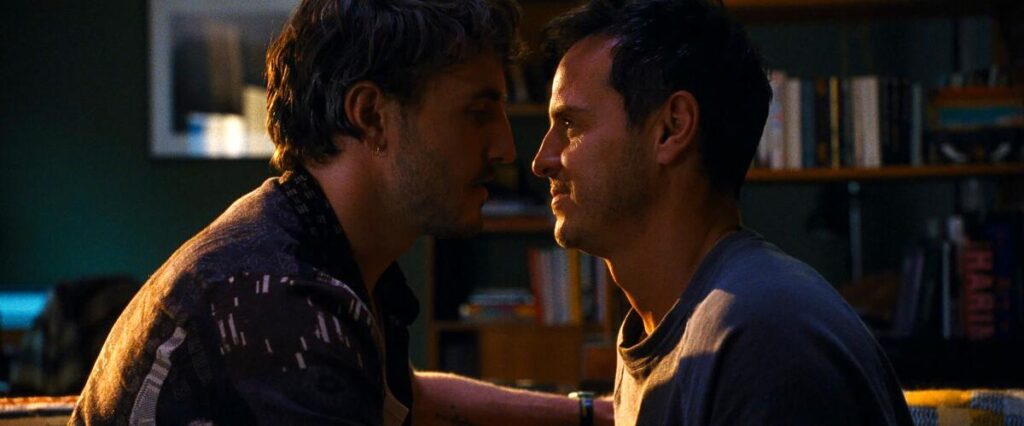Most of us want to connect and be understood. Most of us want to feel less alone in the world. It’s why we read books and watch films. Taichi Yamada’s novel “Strangers,” a ghost story set in Japan, may not be my story, and yet it spoke to me on a profoundly personal level. As Harada, the melancholic screenwriter, wanders back to his childhood home on the outskirts of Tokyo to reconnect with his parents, I was transported to my own childhood home, pulled into my own past. His story was becoming my own, and that is what I needed to put on the page.
Filmmaking is always exposing, but for this movie to work, I knew I had to dig further into my own life than I had before in my work. I needed to be specific, hoping that honesty would unlock the universal themes of the piece. It is worth stating that this is not an autobiography; unlike the protagonist, my parents are still alive, but the story offered the scope for me to examine loneliness and loss, and how these experiences shape our childhood and ultimately define the adults we become. It allowed me to explore my understanding of love, both familial and romantic, and how those dual aspects can inform each other, for better and worse.
Unlike the original source material, there was never a question that I would keep the central character straight. If this was ultimately a story about love, then it was important to me that it would portray queer love. I had been looking to say something about growing up gay in the 1980s for some time and how that experience haunts many of us like a ghost, but I hadn’t found the right story until now. Telling any queer story can be a challenging experience. The pressure of representation can be a heavy burden, but I knew I wanted my focus to be narrow, to the experience of a distinct generation of gay men who grew up in a certain time and place. Again, specificity became the mantra.
The script came together during the pandemic: trapped in my apartment, separated from family, fearful of what might happen to the world and everyone in it. I dug deep into my own memories: photos, diaries, music. Many of my own stories became Adam’s. And as I wrote about my protagonist returning to his family home, it was my own childhood home I pictured. And then, as we prepared the production, I made the decision to shoot in that actual location, a place I hadn’t been back to in more than 40 years. I wasn’t totally prepared for how it would make me feel, but it seemed like a good idea at the time.
It was a strange experience working in that space, shooting scenes in my parents’ old bed or around the Christmas tree in a version of my old front room. I felt dragged backwards and forwards in time. I developed eczema again, something I hadn’t had since I was young. The body seems to remember. I wasn’t the happiest of kids. Interestingly, it seemed to have an effect on many of the cast and crew too, all navigating their own complicated relationships with their pasts as the film’s themes emerged throughout the production. Again the specific seemed to be becoming universal.
Paul Mescal, left, and Andrew Scott star in “All of Us Strangers.”
(Searchlight Pictures)
Editing was a long process. For months my editor and I were locked alone in a room trying to craft the unusual tone, the liminal space in which the film exists. With it came the growing anxiety that in sharing this film, I would be revealing too much of myself. As we shared cuts, I could sense how over-sensitive I was to any criticisms of the film, feeling it was, in effect, a criticism of me. But if I wanted the film to radiate a certain vulnerability, then it had to contain my vulnerability too.
Now the film is out and seemingly connecting with audiences. It is reassuring to know that perhaps we did something right. We managed to excavate a feeling that others can recognize. We found the universal in the personal. It has allowed people to reflect on their own lives and the important people within it.
I’ve been asked if I feel liberated somehow now that the film is out there. That is a hard question to answer just yet. I do feel that making the film has given me a greater understanding of the nature of love and its power to soften the harder edges of life, but it has not been an easy ride. Nor, perhaps, should it be. Making any kind of art is often both as joyous and as painful as life itself, but that doesn’t mean we shouldn’t keep trying.
I’ll end with a quote from Jung. “Real liberation comes not from glossing over or repressing painful states of feeling, but only from experiencing them to the full.”

